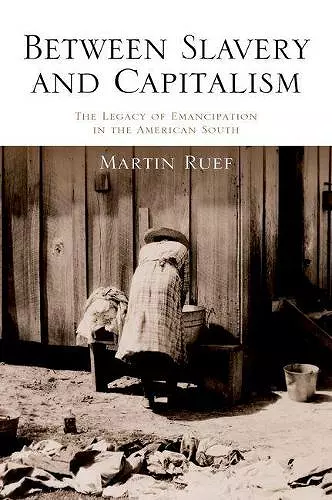Between Slavery and Capitalism
The Legacy of Emancipation in the American South
Format:Hardback
Publisher:Princeton University Press
Published:12th Sep '14
Currently unavailable, and unfortunately no date known when it will be back
This hardback is available in another edition too:
- Paperback£28.00(9780691173597)

At the center of the upheavals brought by emancipation in the American South was the economic and social transition from slavery to modern capitalism. In Between Slavery and Capitalism, Martin Ruef examines how this institutional change affected individuals, organizations, and communities in the late nineteenth century, as blacks and whites alike learned to navigate the shoals between two different economic worlds. Analyzing trajectories among average Southerners, this is perhaps the most extensive sociological treatment of the transition from slavery since W.E.B. Du Bois's Black Reconstruction in America. In the aftermath of the Civil War, uncertainty was a pervasive feature of life in the South, affecting the economic behavior and social status of former slaves, Freedmen's Bureau agents, planters, merchants, and politicians, among others. Emancipation brought fundamental questions: How should emancipated slaves be reimbursed in wage contracts? What occupations and class positions would be open to blacks and whites? What forms of agricultural tenure could persist? And what paths to economic growth would be viable? To understand the escalating uncertainty of the postbellum era, Ruef draws on a wide range of qualitative and quantitative data, including several thousand interviews with former slaves, letters, labor contracts, memoirs, survey responses, census records, and credit reports. Through a resolutely comparative approach, Between Slavery and Capitalism identifies profound changes between the economic institutions of the Old and New South and sheds new light on how the legacy of emancipation continues to affect political discourse and race and class relations today.
Winner of the 2015 Viviana Zelizer Award for Best Book, Economic Sociology Section of the American Sociological Association "[A] compelling analysis of the swiftly changing economic and social institutions in the American south after the Civil War."--Heather A. Haveman, Administrative Science Quarterly "The book excels in providing a comprehensive analytical framework for understanding large-scale social change... Ruef makes excellent use of a wide range of data, including both historical census data and interviews with former slaves conducted by the Federal Writers' Project, to consider patterns of intergenerational status attainment among those who lived through emancipation... A fine exemplar of a historical-comparative analysis of economic change."--Joseph O. Jewell, American Journal of Sociology
ISBN: 9780691162775
Dimensions: unknown
Weight: 539g
304 pages